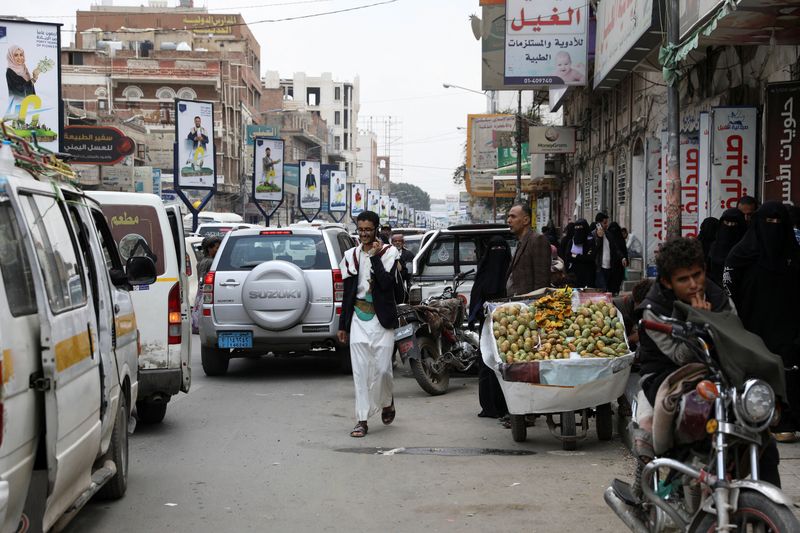BEIRUT (Reuters) - Yemen's warring parties have agreed to extend a U.N.-brokered truce for another two months in a conflict that has killed tens of thousands of people and spawned a major humanitarian crisis.
How did the Yemen war begin, why does the truce matter and can it be turned into a broader peace process?
HOW DID THE WAR BEGIN?
The war began in late 2014 when the capital Sanaa was seized by the Houthis, an Iran-aligned movement belonging to the Zaydi sect of Shi'ite Islam with a power base in the north.
Worried by the growing influence of Shi'ite Iran along its border, Sunni powerhouse Saudi Arabia intervened at the head of a Western-backed coalition in March 2015 in support of the Saudi-backed government.
The Houthis established control over much of the north and other big population centres, while the internationally recognised government headquartered itself in Aden.
HOW DID THE TRUCE COME ABOUT?
The parties agreed to a two-month truce in April sponsored by the United Nations after intensified international efforts following an escalation of military operations in Yemen and Houthi strikes on Saudi Arabia and the United Arab Emirates.
Yemen became a point of tension between Saudi Arabia and the United States under the administration of Joe Biden, who had halted U.S. support for offensive coalition operations.
Riyadh was already seeking to exit a war that had been in military stalemate for years before the Houthis advanced in energy-rich Marib and in Shabwa, where they were repelled by UAE-backed Yemeni forces.
The conflict is also seen as a bargaining chip for Iran, with which Saudi Arabia launched direct talks last year.
The terms of the truce deal, rolled over in June, allowed some fuel shipments into Hodeidah port to ease severe shortages in Houthi-held areas and select commercial flights from Sanaa.
Parallel talks were launched to reopen main roads in Taiz, which remains effectively under Houthi siege, but stalled.
WHY A RENEWAL MATTERS
The U.N. special envoy has credited the truce with bringing the longest period of relative calm in over seven years and a significant decrease in civilian casualties.
Humanitarian groups say the Sanaa flights have allowed over 8,000 Yemenis to access medical care and pursue education and business opportunities. Greater access to fuel has helped maintain public services and access to them.
The truce has also increased humanitarian access in a country where more than 17 million people require food aid.
The U.N. is seeking an extended and expanded truce to provide a platform for further trust-building, discussions on economic priorities such as revenues and salaries and on establishing a permanent ceasefire.
The ultimate aim is to move toward a political settlement that comprehensively ends the conflict.
WHAT ARE THE PROSPECTS OF POLITICAL PROGRESS?
Turning the truce into a political agreement is seen as a tall order due to deep mistrust and competing agendas among Yemen's myriad factions. Even within the anti-Houthi coalition there are several groups vying for power, including UAE-backed southern separatists who want to split from the north.
"Given that the parties to the conflict have sharply different ideas about what a peace process might look like, it will be very difficult to transition from truce to talks," said Peter Salisbury of Crisis Group.
To build confidence, the United Nations would need to make progress on reopening roads in and around Taiz city and negotiating nationwide salary payments, he said.
HOW BIG IS THE RISK OF MORE FIGHTING?
Both sides have reported alleged truce violations and reinforcements to main front lines, the U.N. says.
Amr al-Bidh of the separatist Southern Transitional Council, part of the anti-Houthi alliance, has said sides are warily preparing for fresh hostilities even with a truce extension.
Yemen needs a political process that creates space for long-term multiparty dialogue, Salisbury said.

"But the more likely outcome is a big international push for a peace deal that addresses the Houthis’ and the Saudis’ needs, but leaves most other Yemeni groups marginalised and livid — a breeding ground for renewed conflict."
Riyadh wants to focus on economic ambitions and improve ties with Washington. Sources have said the Biden administration is discussing possibly resuming U.S. sales of offensive weapons to Riyadh, but any final decision would hinge on securing a permanent ceasefire.